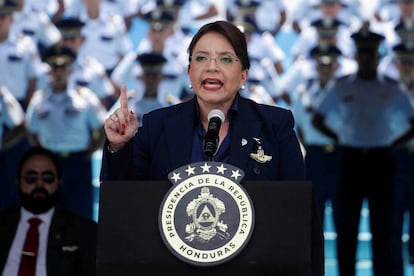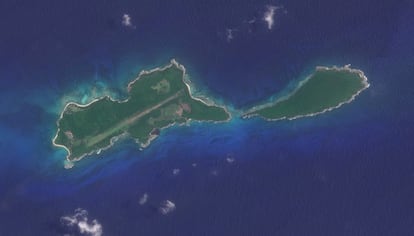A Honduran Alcatraz: Xiomara Castro intends to build a prison on an island for 2,000 gang members
The maximum security mega-complex will be located in a Caribbean archipelago. ‘The idea is for criminals to lose touch with everything,’ says the government


Locking up hundreds of dangerous criminals on an island is Honduran President Xiomara Castro’s new plan to tackle the violence that is bleeding the Central American country dry. The Honduran government, overwhelmed by crime, plans to build a huge high-security prison on the Swan Islands. The uninhabited archipelago located in the northwestern Honduran Caribbean, will host gang leaders who have unleashed terror on the country. The complex will have a capacity for around 2,000 people and will be so isolated that communications will only be possible via satellite, Honduran authorities told the AP news agency. “It’s as far away as they can be, so these gang leaders feel the pressure once they’re on the island. The idea is that they lose contact with everything, with all of society ... and they can really pay for their crimes,” said José Jorge Fortín, head of the Honduran armed forces.
The island prison is the latest desperate measure by the Castro government. A series of bloody incidents have shown that gangs and other criminal groups have extensive control in the prisons and in vast swathes of the country, one of the poorest and most underdeveloped on the continent. Castro has reversed her campaign promises to tackle crime through deep political reforms to clean up the corrupt justice system. Instead, she has opted for a draconian approach, following in the footsteps of El Salvador’s populist President Nayib Bukele. In the aftermath of the June massacre in a women’s prison near the capital, Tegucigalpa, which left 46 inmates murdered, several of them burned to death, the president assured the nation that she will take “drastic measures” to stop the bloodshed. Just four days later, however, a series of criminal attacks demonstrated that the violence is out of control: in a single day, 21 people were killed in two massacres in the north of the country.

Castro has opted for the “Bukelization” (a reference to Salvadoran President Nayib Bukele’s self-declared war on crime) of her security policy. She has announced extreme measures including curfews, partial states of exception to combat crime in 120 communities, and has deployed the military and police to retake control of areas taken over by criminal groups, where she has also suspended citizens’ constitutional guarantees. In addition, there are now plans to build a mega-prison on the Swan Islands, a sort of Honduran Alcatraz where authorities hope, at last, to cut off gang leaders who continue to carry out their criminal activities from the current conventional prisons, largely with the support of corrupt prison officials. “I have taken measures to provide them with security in the face of the brutal and ruthless terrorist attack to which they are being subjected by hired thugs, trained and directed by drug kingpins, who operate with impunity,” the president wrote in mid-June in a string of messages posted on her Twitter profile.
Honduran security authorities have had to look to El Salvador to calm criticism of their inability to deal with the violence in a country where, according to United Nations data, young people between the ages of 18 and 30 continue to be the main victims of homicides. “If another country has done something well, why not copy it?” the head of the Honduran armed forces, José Jorge Fortín, told the AP. “We are not going to allow this atmosphere of terror to continue.”
So far, the government has not provided further details on the construction of the prison, which will alleviate overcrowding in the country’s other prisons. In late July, the Military Police released images showing hundreds of men who had been arrested and forced to remain in their underwear while being guarded by dozens of officers, in a move aimed at regaining control of prisons. “We are initiating activities to stop prisons operating like schools for criminals and to break the cycle with organized crime,” said José Manuel Zelaya, Secretary of State for National Defense. But this action is not enough to reduce violence and that is why the Castro government now aspires to build a mega-prison in the Caribbean.
As she tries to appease Hondurans’ criticism of the violence with these heavy-handed measures, the president is also opening an international front. Castro has announced that she is moving forward with the United Nations to create a commission similar to the successful CICIG deployed in Guatemala to address corruption and impunity. “With respect, I have informed the UN Mission of experts that the agreement for the installation of the CICIH should be ready and signed in the coming months. I will personally speak with Secretary Antonio Gueterres [UN Secretary General]. We can’t wait any longer,” she said.
Sign up for our weekly newsletter to get more English-language news coverage from EL PAÍS USA Edition
Tu suscripción se está usando en otro dispositivo
¿Quieres añadir otro usuario a tu suscripción?
Si continúas leyendo en este dispositivo, no se podrá leer en el otro.
FlechaTu suscripción se está usando en otro dispositivo y solo puedes acceder a EL PAÍS desde un dispositivo a la vez.
Si quieres compartir tu cuenta, cambia tu suscripción a la modalidad Premium, así podrás añadir otro usuario. Cada uno accederá con su propia cuenta de email, lo que os permitirá personalizar vuestra experiencia en EL PAÍS.
¿Tienes una suscripción de empresa? Accede aquí para contratar más cuentas.
En el caso de no saber quién está usando tu cuenta, te recomendamos cambiar tu contraseña aquí.
Si decides continuar compartiendo tu cuenta, este mensaje se mostrará en tu dispositivo y en el de la otra persona que está usando tu cuenta de forma indefinida, afectando a tu experiencia de lectura. Puedes consultar aquí los términos y condiciones de la suscripción digital.








































